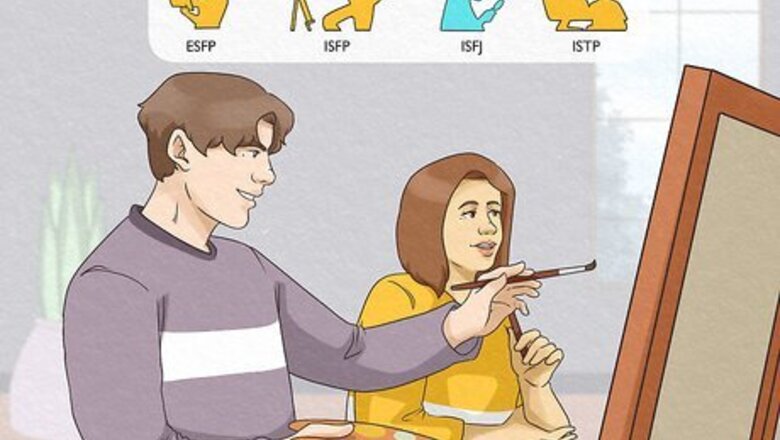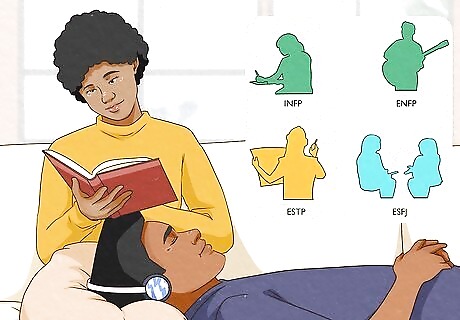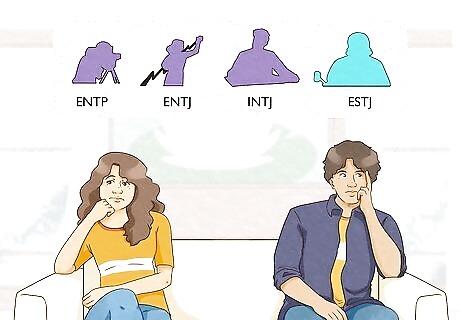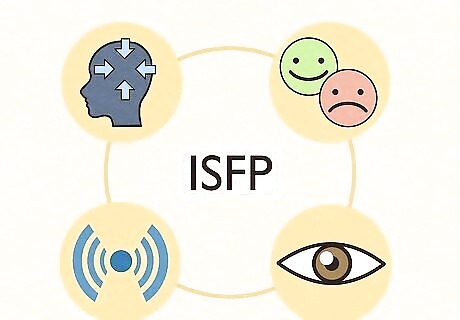
views
ISFP Romantic Compatibility

ISFP’s best matches are ESFPs, ISFJs, ISTPs, and fellow ISFPs. These personality types can be considered as “kindred spirits” with the ISFP personality. They are likely to share the ISFP’s values, interests, and lifestyle, particularly because of their shared “sensing” quality. ESFPs (Extraverted Sensing Feeling Perceiving) have a warmth, creativity, and zest for life that’s shared with ISFPs, but they prefer spending time with others versus flying solo like the ISFP. ISFJs (Introverted Sensing Feeling Judging) relate to the ISFP’s interest in practical, real-world issues, and they’ll enjoy sharing their intellectual ideas and personal stories. ISTPs (Introverted Sensing Thinking Perceiving) share ISFP’s love of spending time alone or in small, intimate groups. Both are thoughtful partners, although ISTP prefers logical decisions over emotional ones. ISFPs (Introverted Sensing Feeling Perceiving) can be a great match with their own personality type as they understand each other's need to embrace the moment and find adventure in their everyday life.

ISFPs are also highly compatible with INFPs, ESFJs, ESTPs, and ENFPs. These personalities have a lot in common with ISFPs, but they also have key differences that make these pairings more magnetic and interesting. ISFP individuals may find themselves particularly attracted to people with these personality types. INFPs (Introverted Intuitive Feeling Perceiving) are extremely similar to ISFP as they’re both highly sensitive and emotional with a shared love of creative lifestyles and hobbies. ESFJs (Extraverted Sensing Feeling Judging) help draw out the reserved ISFP and encourage them to focus on the future while also relating to their need for emotional expression and understanding. ESTPs (Extraverted Sensing Thinking Perceiving) share the ISFP’s spontaneous approach to life, although the ESTP must learn to listen as much as they talk for this relationship to work. ENFPs (Extraverted Intuitive Feeling Perceiving) have a romantic and thoughtful approach to life that balances well with the enjoyment-focused ISFP, as long as both individuals are able to communicate and keep each other grounded.

ISFPs have moderate compatibility with ISTJs, INFJs, ENFJs, and INTPs. You might call these relationships a “slow burn.” While ISFPs may not initially be drawn toward their personalities, they’ll develop more of an interest as they get to know each other better. They have some key values in common but enough differences to complement each other's strengths and weaknesses. ISTJs (Introverted Sensing Thinking Judging) can have a deeply fulfilling relationship with ISFPs if they learn to balance their need for stability with the ISFP’s spontaneity and emotional depth. INFJs (Introverted Intuitive Feeling Judging) value deep emotional connections with their partners, which blends well with the ISFP’s passionate approach to love. However, INFJs may struggle with the ISFP’s focus on the present moment over future planning. ENFJs (Extraverted Intuitive Feeling Judging) and ISFPs have a shared appreciation for beauty and finding freedom in life. Still, the ENFJ may prioritize structure more than the ISFP. INTPs (Introverted Intuitive Thinking Perceiving) like to keep to themselves and go with the flow, like the ISFP, but their logical and rational approach to life may cause a clash in this relationship.

ISFPs are least compatible with ESTJs, INTJs, ENTJs, and ENTPs. These personality types have fundamentally different values and approaches to life than the ISFP. However, while their personalities may clash, they also have an opportunity to learn from one another and develop a wonderful relationship. After all, opposites attract! ESTJs (Extraverted Sensing Thinking Judging) enjoy structure, organization, and predictability, which can be difficult to balance with the ISFP's relaxed approach to life. INTJs (Introverted Intuitive Thinking Judging) may view ISFPs as overly emotional, while the ISFP often perceives the INTJ as cold or apathetic—but this couple can find their groove with open communication and empathy. ENTJs (Extraverted Intuitive Thinking Judging) have extremely high expectations for their romantic partners and focus on career goals over emotional ones, which may clash with the go-with-the-flow ISFP. ENTPs (Extraverted Intuitive Thinking Perceiving) are the super outgoing opposite of the intuitive and reserved ISFPs, but this mutually adaptable couple can mend their differences with active listening.
ISFP in Love & Relationships

An ISFP in love is enthusiastic and passionate, albeit guarded. They are extremely emotional and romantic people at their core. However, it can take time to see this side of them. ISFPs don’t fall in love easily and must feel secure and completely accepted before they fully open up to a partner. They need a significant other who makes it clear that their love and attention are valued. If you're interested in an ISFP, it’s crucial to encourage their passions and respect their need for privacy and individuality.

ISFPs always put their partner’s preference first. They hate to cause conflict, but they often defer to their partner’s wants without presenting any of their own. These people-pleasing tendencies can be nice to begin with, but the lack of boundaries will eventually cause discomfort and resentment in the relationship. To help strengthen their relationship, an ISFP’s significant other can make intentional space for them to offer their opinion. By avoiding any judgemental or critical language, an ISFP will also feel more comfortable expressing their needs over time.

Male and female ISFPs tend to exhibit different behaviors when in love. In general, male ISFPs are much more reserved than females. They’re deeply sensitive and take much longer to let their guard down. While a male ISFP may not be one for bold gestures, they’ll indicate their love in more subtly attentive ways. Conversely, female ISFPs will enthusiastically display their love and passion. Often, you can tell that an ISFP gal is in love because she’ll want to spend as much time with her S.O. as possible.

ISFPs show love through time, attention, and psychological support. The Adventurer personality type will give all of their time and energy to someone they’ve fallen in love with. They’ll go on a whirlwind, drawn-out date likely to feature some spontaneous adventure. While an ISFP’s love interest may need to do more of the conversational work at the start, they’ll never doubt that they have the ISFP’s full and undivided attention. Along with providing quality time, ISFP’s enjoy being a source of support for someone they’ve fallen head-over-heels for. ISFPs need a partner who is open and expressive, so they’ll try to build romantic bonds through mutual vulnerability and active listening.

ISFPs are great listeners but struggle to communicate their own needs. They’re constantly taking on other peoples’ ideas and emotions, so they can sometimes seem detached from active communication. However, they deeply consider what their conversation partner is sharing with them and fully form a thought-out response. When they do respond, ISFPs are effective and open-minded communicators. They present their ideas clearly and are skilled at creating a positive environment for friendly debate or honest communication. ISFPs face more of a struggle when communicating around topics based on logic or rationality. They prefer deeply meaningful and emotional conversations.

As lovers, ISFPs are focused on their partner's pleasure. Their goal in any intimate experience is to fulfill their partners’ desires. Due to their spontaneous nature, time spent in the bedroom is often passionate, innovative, and intense. They want to take their time and create a meaningful and sensual experience for their partner. However, ISFPs may be so focused on their partners’ physical needs that they express their own. For the health of a long-term physical or emotional relationship, it's crucial that the ISFP learns to communicate their own desires, fantasies, and needs in the bedroom.

ISFPs are typically attracted to exciting and caring partners. They like a bit of thrill in their relationship, so someone who identifies as a homebody or lover of abstract concepts and theories likely isn’t the best fit. Rather, an ISFP will be drawn toward someone who comes off as authentic, sincere, and outgoing. Due to their “feeling” trait, ISFPs also usually date people whom they perceive as emotionally intelligent and empathetic. Aside from initial attraction, ISFPs do best with people who make them feel comfortable and accepted. ISFPs thrive in relationships with people who don’t criticize their sensitivity or speak without thinking. They need an empathetic and attentive partner who gives them room to share their thoughts and opinions.

ISFP strengths in a relationship include passion, flexibility, and loyalty. An ISFP’s warmth and lust for life translates into them being a very exciting and loving partner. They’re likely to sweep their S.O. off their feet with whirlwind vacations or spontaneous activities. However, ISFPs are equally capable of sitting down and attentively listening to their partner. ISFPs enjoy being a source of support for loved ones, which is a huge strength when it comes to relationships. Additionally, ISFPs are very laid-back and will let their partner take the reins in a relationship. Most of the time, they’re more than happy to go with the flow!

An ISFP’s red flags include conflict avoidance and lack of planning. ISFPs will avoid conflict at all costs—while this can sometimes be good as they’ll never pick a fight with their partner, it also means that healthy disagreements can stall out and the conflicts remain unresolved. ISFPs also struggle to focus on future plans or stick to a defined schedule. They don’t really have a knack for big-picture or long-term planning, so they need a partner who can do some of that work for them. Sometimes, ISFPs can appear mysterious and closed-off. While they truly have a rich inner emotional world, they may be slow to verbally express those emotions to a partner.

ISFPs may struggle to accept the end of a relationship. They feel things very deeply, so regardless of whether they’re the breaker-upper or the broken-up-with, they’ll take it hard. An ISFP may wallow for a long time and prefer to dwell on their pain by listening to sad music or simply reflecting on the relationship in silence. To heal from a breakup, ISFPs can spend time with loved ones who help pull them out of their sadness.
ISFP Personality Type

An ISFP is a personality type with introverted, sensing, feeling, and perceiving traits. This personality profile and its traits are determined by the Myers-Brigg Type Indicator, or MBTI. The MBTI assigns each person to one of 16 personality types as defined by the test. By learning and understanding the MBTI system and their personality type, people are able to better understand the way they function in relationships and other aspects of life.

ISFPs are quiet, sensitive, and kind. They’re extremely down-to-earth and empathetic toward others. While they may come off as reserved at first, they have extremely warm and friendly dispositions that make them a wonderful friend or partner.

ISFPs enjoy living in the present moment. An ISFP can often be found marveling at the beauty of the world around them and finding wonder in even the most everyday things. They value spontaneity and adventure and carry this carefree nature with them in every aspect of their life. However, it’s easy to mistake an ISFP for being a romantic or idealistic dreamer—this isn’t the case. ISFPs are action-oriented. They won’t be caught sitting in their room making a vision board for all their future plans; they’ll be too busy already putting them into action.

ISFPs are open-minded and enjoy hearing everyone’s opinions. They don’t have a judgmental bone in their body. In fact, ISFPs place a high value on each person’s differences and the strengths they bring to the table. Whatever their own opinion on a subject, they’ll be interested in hearing other people’s perspectives and evaluating why that person thinks the way they do.
ISFPs as Parents

ISFPs are warm, devoted, and affectionate parents. They are always attentive and aware of their child’s practical and emotional needs, just like they are with friends and romantic partners. An ISFP genuinely enjoys providing for their children and creating a comfortable home for them to grow up in.

ISFPs value quality time with their families. As a parent, an ISFP will put a focus on building intimate family connections. They may carve out time for the family to spend together by doing something exciting and new, like going to a local festival, cooking a new recipe, or taking a family trip.

ISFPs encourage their children to explore and try new things. As a spontaneous and fun-loving personality themselves, ISFP parents are likely to encourage those same go-with-the-flow qualities in their kids. An ISFP parent might encourage their teen to take a gap year before heading to university or give their kid a lax curfew so they’re able to (safely) have the freedom and privacy they need as a young adult.
ISFPs as Friends

ISFPs make for curious and open-minded friends. They appreciate the uniqueness and individuality of their friends and are always interested in hearing someone’s personal stories and opinions. While they may seem reserved when first meeting someone, an ISFP’s warmth and infectious joy are sure to start shining through in no time.

ISFPs are a great source of support for their close friends. An ISFP will always be there to cheer you on or offer you a shoulder to cry on. They’re extremely empathetic and understanding, and their adeptness at picking up on emotional cues means you won’t even have to tell them when something’s wrong.

ISFPs enjoy laidback, spontaneous activities with friends. The main goal of an ISFP’s life is to have fun, and that comes through in their approach to friendships. They love to have casual outings and go wherever the wind takes them. People who prefer more traditional lifestyles and structured environments may struggle with an ISFP friendship. However, they’ll have no shortage of unique and exciting memories together.
















Comments
0 comment